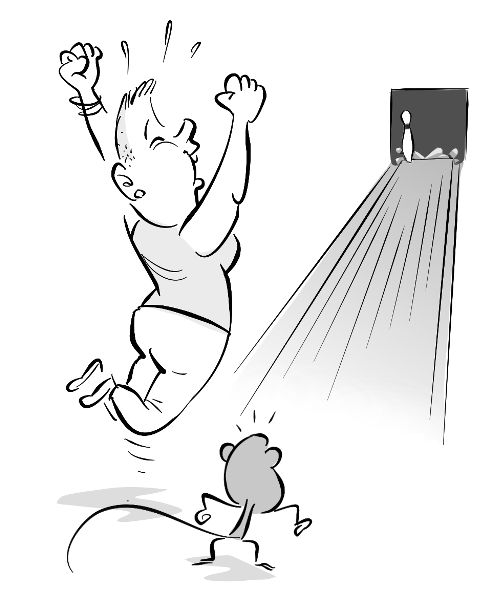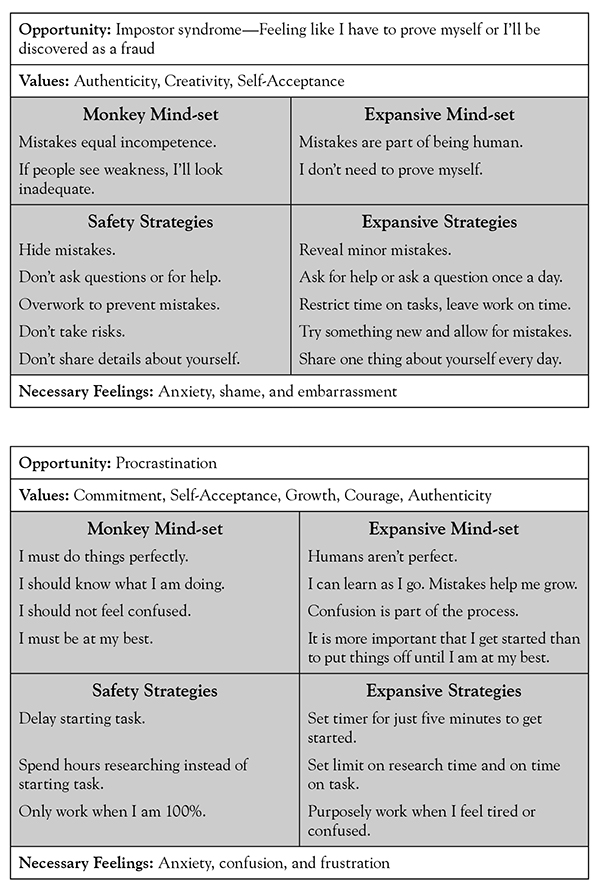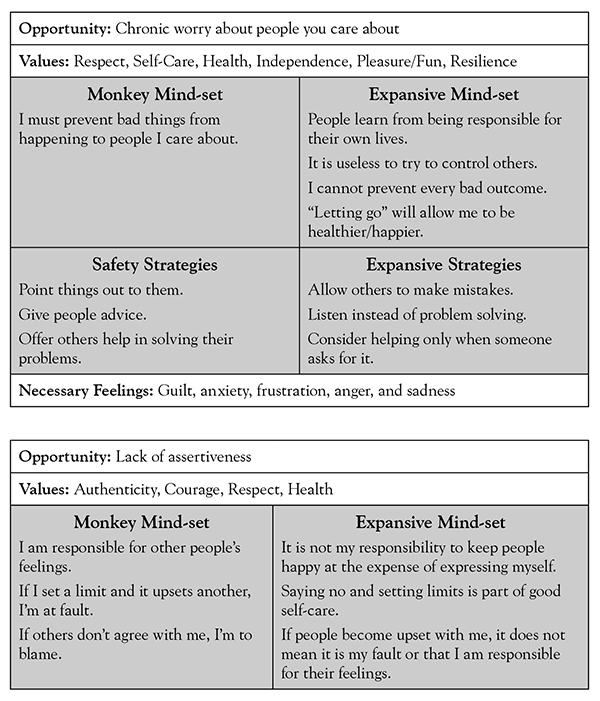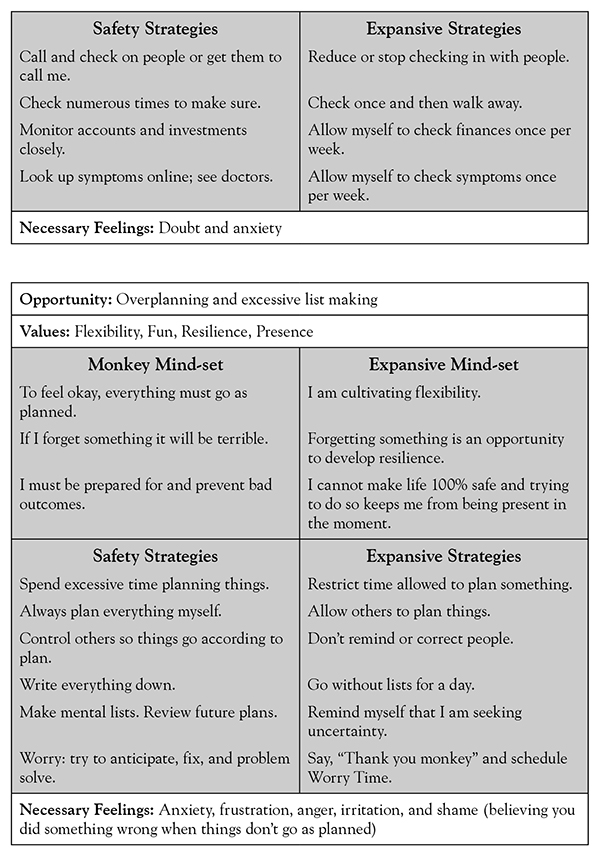Chapter 9
Lowering the Stakes
A few decades ago when video games were in their infancy, my six-year-old son was playing a cute game called Lemmings one day when my husband walked in. “Wow, this looks like fun,” he said. “Can I play?” In less than a minute he was thoroughly crushed. “I guess I’m no good at video games,” he sighed.
Our little sage turned and put his hand on his father’s shoulder. “It’s okay, Dad. You’re just not ready for level 34.”

Level One
You may begin your day tomorrow morning with the best of intentions, to meet each alarm of the monkey mind with a new response, welcoming necessary emotions as they arise. Determined as you may be, however, your chances of completing the day without being hijacked are similar to those my husband had of completing level 34 of Lemmings. To keep an expansive mind-set is exceedingly difficult when you are blindsided by the monkey with high doses of anxiety.
Until you develop some resilience to anxiety, the best leverage you have with the monkey during your practice is to begin at level one. This means choosing situations for your practice that you know are not major threats to your survival. Low-stakes situations are less likely to trigger overwhelming anxiety, and you’ll be more capable of maintaining your new expansive mind-set and strategies.
For example, does your over-responsibility have you doing too much overtime? While you could make an appointment with your boss tomorrow to set some clear limits, you’d be better off at a lower level like planning to leave work on time that day. If you have difficulty making decisions because you need to be certain, before you take on retirement planning, go into an ice cream parlor and try a flavor you’ve never tried before. You don’t need to present at TED Talks to tackle performance anxiety. Try cooking dinner for friends, which will also challenge your perfectionist monkey mind-set. While these small-stakes situations may seem of little consequence, you will be learning more than you think. Here’s why.

Since your monkey mind-set is system wide, the safety strategies you use in low-anxiety situations are the same that you use in high-anxiety situations. Whether you are negotiating a million-dollar deal at work or negotiating which movie to stream with your spouse, the monkey is there. Whether you are choosing a college or choosing a pair of earrings, safety beckons. Nearly every situation throughout your day pits your values against the monkey’s. All situations, no matter how routine or inconsequential, are opportunities to practice your new mind-set. Here are some situations my clients chose to practice with.
Eric’s perfectionism exhibited itself not only at his workplace, but in his personal life. He wasn’t going to the gym because he was overweight. He never cooked for himself because he might forget an ingredient or burn something. He >didn’t engage in small talk with his neighbors because he might say the wrong thing. All these situations became low-level practices for him.
Maria needed to be certain not only about her health, but about her finances, her friends, and her shopping purchases. She only invested T-bills, associated only with people from her church, and had difficulty deciding even on a pair of shoes to buy. Likewise, Samantha felt responsible for the lost pets she saw on posters, and was reluctant to bother the barista by asking for more half-and-half when the pitcher was empty. Neither of them had to look far to find suitable practice situations.
What’s your level one? There are lots of suggestions ahead, but it will be up to you to choose. Try to hit the sweet spot, where enough anxiety or fight-or-flight sensations are aroused that you are challenged, but not so much that you will revert to a safety strategy.
By now you’ve likely got a pretty good idea of which of the three monkey mind-sets you have been operating under. Each of them has its own particular set of opportunities for expansion. I hope those that I’ve listed here will inspire you. You may be surprised at how simple, or even playful, some appear to be. Others may look completely formidable to you. Regardless how big or small, each opportunity will present a challenge. If you remember to choose opportunities that are just outside your present zone of comfort, with stakes that you can handle, your practice will be both rewarding and sustainable.
Celebrating Imperfection
Here are some opportunities for the perfectionist monkey mind-set, which does not allow for making mistakes. Values that you are looking to nourish include creativity, risk, and adventure. Add acceptance and compassion to the list—they’ll be needed when your inevitable mistakes are made. You’ll also want flexibility and resilience in order to recover from them.

A mind-set that celebrates imperfection is characterized by these beliefs:
- I know I will do some things well and other things poorly, and neither reflects my worth as a person. (Unconditional self-acceptance)
- Mistakes, judgments, and criticism are signs that I have taken a risk and seized an opportunity for growth.
- I am motivated by excellence, creativity, and purpose.
- It is more important to do my personal best than measure myself against others’ accomplishments.
- Being imperfect and fallible is part of being human.
>Here are some examples of perfectionist safety strategies we use in common situations, as well as alternative expansive strategies you can practice using instead.
- Safety strategy: Repeatedly check an e-mail for errors.
- Expansive strategy: Write and send.
- Safety strategy: Organize workspace so it is neat.
- Expansive strategy: Leave some clutter.
- Safety strategy: Put off doing taxes, or anything else you hate.
- Expansive strategy: Set a time and spend five minutes on that task.
- Safety strategy: Attempt to cook the perfect meal.
- Expansive strategy: When cooking for others, allow for mistakes.
The preceding strategies were behavioral. Here are a few opportunities to practice mental expansion strategies:
- Safety strategy: Review the past, looking for mistakes.
- Expansive strategy: Allow yourself to be uncertain about whether you made mistakes in the past.
- Safety strategy: Worry when reminded of a problem.
- Expansive strategy: Use the five-step problem-solving process.
For a complete list of Safety Strategies versus Expansive Strategies for the Perfectionist, visit http://www.newharbinger.com/35067.
Here are a few all-purpose Expansion Charts to help your practice. Each of them addresses a specific problem area common to those of us with a perfectionist mind-set.

Seeking Uncertainty
If you’re someone who really needs to know what’s going on, and can’t relax until you know for certain, some values you might want to practice are acceptance of the inherent chaos of life on this planet, flexibility when things do go wrong, and, should you get blindsided by something you don’t expect, resilience. And let’s not forget gratitude for what goes right!

The expansive mind-set that seeks uncertainty is characterized by these beliefs:
- It is more important to live life fully in the present moment than to spend time predicting what might go wrong in the future.
- I will assume safety unless there is clear evidence of danger.
- It is important to practice flexibility and learn to cope when things do not go as planned.
- I can take reasonable precautions knowing that I can influence but not control outcomes.
Here are some examples of safety strategies commonly used in anxiety-producing situations and expansive strategies you might use as alternatives.
- Safety strategy: Check to see if loved ones arrive safely.
- Expansive strategy: Assume safety and allow for uncertainty.
- Safety strategy: Research uncomfortable sensations online.
- Expansive strategy: Breathe into uncomfortable situations.
- Safety strategy: Make sure you packed everything for a trip.
- Expansive strategy: Limit packing time.
- Safety strategy: Postpone decisions until you are sure.
- Expansive strategy: Set a time to make a decision even if you’re unsure.
The strategies above are behavioral. Here are a few opportunities to practice mental expansion strategies:
- Safety strategy: Weigh pros and cons over and over in your mind to make sure you’re making the best decision.
- Expansive strategy: Allow for uncertainty. Ask for uncertainty. Ask for more anxiety too.
- Safety strategy: Worry over the same problem repeatedly.
- Expansive strategy: Thank your monkey, and ask for more. Or schedule yourself a Worry Time.
For a complete list of Safety Strategies versus Expansive Strategies for Intolerance of Uncertainty, visit http://www.newharbinger.com/35067.
Certain problem areas come up over and over again for my clients with a need for certainty. I’ve put together a few Expansion Charts you can use with those problems too.
Letting Go of Over-responsibility
For those of us with the mind-set that we are responsible for the health and happiness of everyone we love, some values you will be cultivating are health and autonomy, pertaining to taking care of yourself, trust in others to be responsible for themselves and learn from their own mistakes, and honesty, respect, and compassion toward both yourself and others.

A mind-set of letting go of over-responsibility will be characterized by these beliefs:
- People are responsible for their own lives and choices they make. Consequences of their actions are not my fault.
- My primary responsibility is for myself, not others.
- It is not my job to step up when others fail to do their fair share. I am willing to allow the consequences of other people’s action or inaction.
- When people are in pain I can listen with compassion, but it is not my job to fix or solve their problem.
- I can be sensitive to other people’s problems without taking responsibility for them.
- Saying no and setting limits is my right.
Here are a few safety strategies we often use in common situations. Paired to each safety strategy is one expansive strategy; can you think of others you could employ?
- Safety strategy: Fill in for others’ lapses.
- Expansive strategy: Let others do things themselves.
- Safety strategy: Prioritize others’ needs over your own.
- Expansive strategy: Prioritize your own needs three times per week.
- Safety strategy: Provide solutions to others’ problems.
- Expansive strategy: Listen with compassion; don’t problem solve.
- Safety strategy: Step up to compensate for others’ failings.
- Expansive strategy: Don’t assume others’ workload.
Visit http://www.newharbinger.com/35067 for more examples.
Just as important as changing behavioral strategies is changing mental safety strategies, like reviewing and worrying over other people’s problems when you are away from them. An expansive mental strategy to counter this is to accept the uncertainty of not knowing if they are okay. Remind yourself that you cannot control how others live their lives. Then focus on your own self-care, putting your higher brain to work on some of your own needs that you’ve been neglecting. Here are a few examples of mental expansion strategies you can use to counter I am responsible for everyone’s happiness and safety beliefs.
- Safety strategy: Think about others’ problems when alone.
- Expansive strategy: Purposely focus on self-care.
- Safety strategy: Review in your mind what you could or should have done differently to help someone.
- Expansive strategy: Interrupt this review by accepting the possibility that you made mistakes.
Remember that every time you practice an expansion strategy, breathing into the necessary emotions that arise will be crucial to your success.
Here are a few sample expansive charts based on problems—otherwise known as opportunities—common among those of us with an over-responsible mind-set. They are meant to offer you ideas of areas that you may want to work on.

At this point I’ve given you all the tools you need to begin to transform your life from one that is defined by fear to a life defined by your values. There is nothing better you can do for yourself than to take up this challenge. Remember to keep the stakes low at first. Give your new mind-set a chance to take hold before proceeding to the next level. Over time you will see big results, including resilience to anxiety that enables you to master situations that were problems for you in the past. Once you get a taste of this I bet you’ll want to keep expanding your world.
Taking Off
It has been estimated that on average, up to 25% of a plane’s fuel is burned during takeoff and ascent. This is due to the drag of the earth’s atmosphere—at higher altitudes air travel becomes more efficient. Right now in this moment you are sitting in your practice plane at the beginning of the runway, wondering if you’ll be able to get off the ground. Your atmospheric drag will be all of the habits and momentum of your past. What’s going to fuel your practice during this crucial takeoff?
In the next chapter I’m going to introduce you to what, in the context of sustaining your expansion practice, is the equivalent of jet fuel. It’s powerful and is in endless supply. Read on and learn how you can mix up some for yourself.



